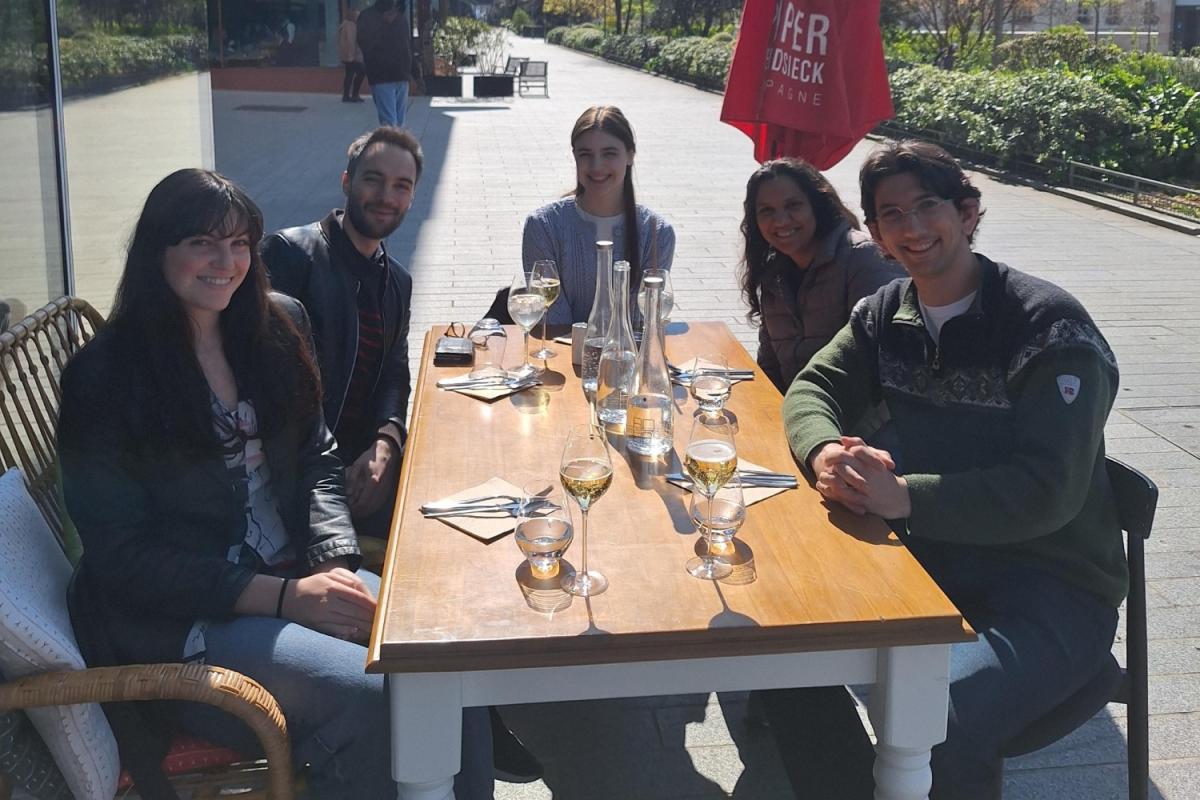
In Brief
- Human rights experts from around the world gathered in Paris to draft new guidelines on the investigation of gender-based killing.
- The conference was organized by United Nations Special Rapporteur Morris Tidball-Binz, currently Visiting Senior Research Associate at the Pozen Center.
- He was accompanied by two interns from the Global Human Rights Lab, a practice space that connects UChicago students to active human rights investigations.
- Applications for academic year 2025-26 internships at the lab are due May 26. Learn more and apply.
In the first week of April, College undergrads Katie Kemp and Aimee Stachowiak traveled to the UChicago John W. Boyer Center in Paris to support a conference of experts from around the world as they worked to develop new global guidelines for the investigation of femicide, the gender-based killings of women and girls.
For both students, the Paris trip was a crowning experience of a year spent working for the Pozen Center’s Global Human Rights Lab, a new initiative that places qualified undergraduates on research teams at the Law School’s Global Human Rights Clinic. Under the direction of human rights lawyer Anjli Parrin, these teams gather data on fundamental human rights issues and their legal contexts for use by the United Nations and other global partners.
The femicide guidelines event in Paris was organized by Morris Tidball-Binz, the UN Special Rapporteur on extrajudicial, summary, or arbitrary executions, in partnership with the Global Human Rights Clinic and Pozen Center. Tidball-Binz is currently a Senior Visiting Researcher at the Pozen Center, and the Global Human Rights Lab often provides academic support to his work.
In Paris, Kemp and Stachowiak got a granular look at how international human rights institutions work. While the experts reviewed and discussed a latest draft of the femicide investigation guidelines, Stachowiak, a third-year student double majoring in human rights and media arts and design, kept meeting minutes to create a record of everyone’s suggestions and the debates they sparked. “I wrote about 16,000 words over two days,” she says, recording discussions of everything from autopsy protocols to best practices for witness interviews.
Kemp, a fourth-year majoring in biology (on the global and public health track) and minoring in human rights, made annotations to the most current draft, noting every suggested change. “Seeing how policymaking operates in practice made me all the more excited for my work in human rights,” she says.
In doing this work, both students drew on their experiences this year supporting Tidball-Binz as he worked to produce thematic reports, specialized UN documents that survey the status of specific rights worldwide and make recommendations for how they can be defended and advanced. Much of this support involved building “country reports,” surveys of the different ways a right is addressed (or ignored) in existing national laws, policies, and procedures.
Kemp contributed to country reports for an upcoming thematic report on unlawful killings by law enforcement. Stachowiak did the same for an upcoming report on the rights of family members of victims of unlawful killings. Each student had their information gathering supervised by a Law School student, who then worked with Parrin to incorporate their findings into academic reports designed to support the process of drafting of the thematic report. Two Law School students also attended the Paris conference.
“I learned so much about all the moving pieces of truly global human rights work,” Kemp says. “A lot of work goes into these reports. I also learned how meaningful it feels. Getting all this information in one place can help people talk about it in a new way, and that eventually makes change possible.”
In advance of their trip to Paris, Kemp and Stachowiak used the research skills they developed during the year to research the current state of femicide laws and investigatory frameworks worldwide, making sure they would be able to follow what the experts were saying.
“It was so inspiring to be in the room with all these experts at the absolute top of their game, all working together to make sure these new guidelines are as comprehensive and useful as possible,” says Stachowiak. “In my courses on human rights law, we talked a lot about the principle of adoptability—about how a new rights law or framework doesn’t mean much if people aren’t willing to adopt it in all kinds of local contexts. Getting to watch these experts work toward that ideal in real-time made it a lot more tangible.”
While at the UChicago Paris campus, Kemp and Stachowiak were also able to attend another human rights event: a panel featuring both Tidball-Binz and Parrin on the role of forensic experts in identifying deceased migrants. Both students were already familiar with the campus thanks to their prior participation in the Pozen Center's Paris Winter Quarter program.
“The students undoubtedly contributed to the success of the meeting," says Tidball-Binz. "This is a wonderful example of the great value of students' participation in academic activities related to UN Human Rights Mechanisms."
- Applications for academic year 2025-26 internships at the Global Human Rights lab are due May 26. Learn more and apply.
